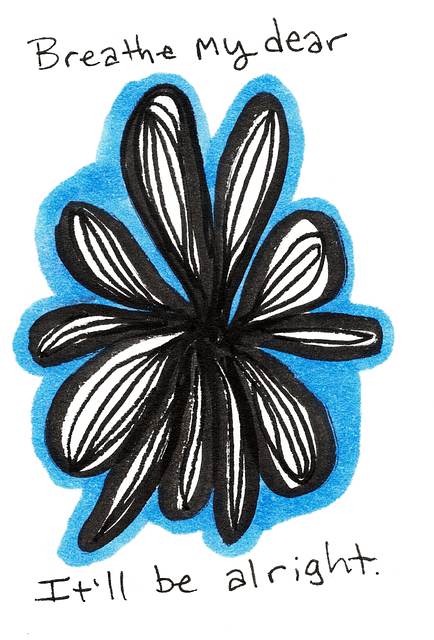Suicide prevention in young children is a critical concern, where the Risk, Frequency, and Momentum (RFM) framework offers a powerful tool. By identifying at-risk individuals early, RFM enables personalized therapy focusing on emotional healing, including play-based interventions like art therapy and storytelling. This approach incorporates social skills training, builds resilience through stress management and mindfulness, and fosters coping mechanisms to prevent escalation of mental health issues. Integrating RFM into early intervention programs aims to strengthen well-being before risk factors emerge, with case studies showing significant success globally. Cultural sensitivity is vital in tailoring support for diverse young children, ensuring effective suicide prevention and improved therapy outcomes.
“The impact of resilience on mental health, especially in young children, is a growing area of interest in suicide prevention. This article explores an evidence-based approach, RFM (Resilience, Strengths, and Coping), to fortify the psychological defenses of vulnerable youth. We delve into its significance in therapy for young children at risk, offering a roadmap for implementation within early intervention programs. By examining successful case studies in schools and communities, we provide insights into navigating challenges and ensuring long-term positive effects.”
- Understanding RFM and Its Significance in Suicide Prevention for Young Children
- Identifying Resilience Building Exercises for Vulnerable Populations
- Strategies for Integrating RFM into Early Intervention Programs
- Case Studies: Successful Implementation of RFM Exercises in Schools and Communities
- Overcoming Challenges and Ensuring Long-Term Impact: Continuous Evaluation and Support
Understanding RFM and Its Significance in Suicide Prevention for Young Children

Suicide prevention among young children is a pressing concern, and understanding Risk, Frequency, and Momentum (RFM) can be a powerful tool in addressing this challenge. RFM is a framework that helps identify individuals at risk by analyzing their behavior patterns, specifically focusing on the frequency of negative behaviors or events and the momentum they gain over time. In the context of therapy for young children, recognizing these patterns early can make a significant difference in suicide prevention efforts.
By utilizing RFM analysis, mental wellness podcast series production can be tailored to target at-risk youth more effectively. It allows therapists to design personalized emotional healing processes that focus on modifying harmful behaviors and promoting positive ones. Moreover, social skills training can become an integral part of these interventions, fostering resilience and coping mechanisms in young individuals. This proactive approach ensures that children receive the necessary support before their situations escalate, ultimately contributing to improved mental wellness.
Identifying Resilience Building Exercises for Vulnerable Populations

Identifying appropriate resilience-building exercises for vulnerable populations, such as young children and those at risk of suicide, requires a nuanced approach. Therapy for young children often involves play-based interventions that foster emotional expression and coping skills. These activities can range from art therapy to storytelling and role-playing scenarios, allowing children to process trauma or stress in a safe and creative environment.
Crisis intervention guidance plays a pivotal role here by offering evidence-based strategies tailored to the unique needs of these groups. Mental health awareness campaigns and initiatives that promote positive thinking can also serve as valuable precursors to more structured resilience-building programs. By integrating these approaches, communities can better equip themselves to support vulnerable individuals during challenging times.
Strategies for Integrating RFM into Early Intervention Programs

Integrating RFM (Resilience, Flexibility, and Mindfulness) into Early Intervention Programs is a strategic approach to enhancing mental health services for young children. By incorporating techniques that promote resilience, such as stress management, emotional regulation, and coping strategies, these programs can equip children with essential tools to navigate life’s challenges. This early intervention is particularly vital in suicide prevention efforts, as it aims to build a strong foundation of well-being before potential risk factors arise.
Therapy for young children should not only focus on addressing symptoms but also on fostering self-care practices and trauma support services. Encouraging the development of a consistent self-care routine can significantly contribute to better mental health outcomes. RFM exercises, when integrated into therapeutic settings, provide an opportunity for children to learn and practice mindfulness, allowing them to become more aware of their emotions and responses, thereby improving their ability to cope with stress and adversity.
Case Studies: Successful Implementation of RFM Exercises in Schools and Communities

In recent years, there has been a growing recognition of the importance of building resilience among young children, particularly in light of rising mental health concerns and suicide prevention initiatives. Case studies from schools and communities across the globe have shown that Implementing Resilient Food and Movement (RFM) exercises can significantly contribute to this goal. These programs focus on integrating physical activity, mindful eating practices, and emotional intelligence-building techniques into daily routines.
For instance, a case study in a suburban school district demonstrated that incorporating RFM exercises into the curriculum led to a notable decrease in anxiety levels among students. The program involved simple yet effective activities like mindful walking breaks, interactive nutrition discussions, and group exercises aimed at fostering self-care routine development for better mental health. Similarly, a community initiative centered around RFM principles successfully empowered local youth, teaching them coping mechanisms that promote emotional well-being. These examples highlight the potential of such interventions to mitigate mental health challenges and build resilience in both academic and community settings, focusing on therapy for young children as a core component.
Overcoming Challenges and Ensuring Long-Term Impact: Continuous Evaluation and Support

Overcoming challenges is a critical aspect of implementing RFM and resilience-building exercises, especially when addressing sensitive topics like suicide prevention among young children. Continuous evaluation serves as a robust tool to gauge the effectiveness of these interventions and ensure their long-term impact. By regularly assessing progress, practitioners can identify areas requiring additional support or adjustment, fostering a more tailored and impactful approach.
Cultural sensitivity in mental healthcare practice plays a pivotal role here. Understanding and respecting diverse cultural backgrounds ensures that therapeutic methods resonate with children from various ethnic and social groups. Communication strategies should be adapted to suit different needs, incorporating age-appropriate language and culturally relevant metaphors to enhance emotional healing processes. This personalized approach not only improves outcomes but also strengthens the bond between the child and their mental health support system.
The implementation of Resilient Factors Model (RFM) exercises holds immense potential in enhancing suicide prevention efforts among young children, especially within vulnerable populations. By integrating these strategies into early intervention programs, we can foster resilience and provide much-needed support. The case studies presented highlight successful RFM applications in schools and communities, demonstrating its effectiveness in promoting well-being. Overcoming challenges through continuous evaluation and tailored support ensures the long-term impact of RFM, offering a promising approach to therapy for young children at risk of suicide.












